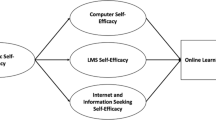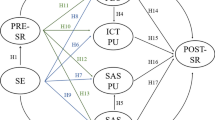Abstract
This study was conducted to investigate the relationship between African American adult students’ computer, Internet, and academic self-efficacy, and their attitudes toward computers, in technology-supported environments. The study examined whether computer and Internet self-efficacy differed between students with high and low levels of user attitude and computer anxiety. Correlations between academic self-efficacy and computer and Internet self-efficacy were also explored. Participants included adult students who were enrolled in face-to-face and online courses at a university in the southern United States. Quantitative approaches (i.e., MANOVA, correlation, and regression) were used to analyze the collected data. Results indicated that adult students showed a higher level of confidence in performing basic computer or software skills and Internet browsing actions in comparison to advanced computer skills or Internet tasks (e.g., tasks related to encrypting/decrypting and system manipulation). Computer and Internet self-efficacy significantly differed between learners with high and low levels of attitudes toward computers. Positive correlations were found between computer self-efficacy, Internet self-efficacy, and academic self-efficacy. Both computer self-efficacy and Internet self-efficacy were significant predictors of academic self-efficacy.
Similar content being viewed by others
References
Austin, B., & Royster, J. (2017). Exploring the use of skype technology for teaching food, nutrition and health to African American elders in Seattle, Washington: A Pilot Program. Journal of the Academy of Nutrition & Dietetics, 116, 80. https://doi.org/10.1016/j.jand.2016.06.281.
Baker, M. M. (2015). The relationship of technology use with academic self-efficacy and academic achievement in urban middle school students. Retrieved from ProQuest (3689105).
Bandura, A. (1977). Self-efficacy: Toward a unifying theory of behavioral change. Psychological Review, 84(2), 191–215. https://doi.org/10.1016/0146-6402(78)90002-4.
Bandura, A. (1982). Self-efficacy mechanism in human agency. American Psychologist, 37(2), 122–147. https://doi.org/10.1037/0003-066X.37.2.122.
Bandura, A. (1986). Social foundations of thought and action: A social cognitive theory. Upper Saddle River, NJ: Prentice Hall.
Bandura, A., & Schunk, E. H. (1981). Cultivating competence, self-efficacy, and intrinsic interest through proximal self-motivation. Journal of Personality and Social Psychology, 41(3), 586–598.
Barbeite, F. G., & Weiss, E. M. (2004). Computer self-efficacy and anxiety scales for an Internet sample: Testing measurement equivalence of existing measures and development of new scales. Computers in Human Behavior, 20, 1–15. https://doi.org/10.1016/S0747-5632(03)00049-9.
Bozionelos, N. (2001). Computer anxiety: relationship with computer experience and prevalence. Computers in Human Behavior, 17, 213–224. https://doi.org/10.1016/S0747-5632(00)00039-X.
Bozionelos, N. (2004). Socio-economic background and computer use: The role of computer anxiety and computer experience in their relationship. International Journal of Human–Computer Studies, 61, 725–746. https://doi.org/10.1016/j.ijhcs.2004.07.001.
Buche, M. W., Davis, L. R., & Vician, C. (2007). A longitudinal investigation of the effects of computer anxiety on performance in a computing-intensive environment. Journal of Information Systems Education, 18(4), 415–423.
Chang, S. L., Shieh, R. S., Liu, Z. F., & Yu, P. T. (2012). Factors influencing women’s attitudes towards computers in a computer literacy training program. The Turkish Online Journal of Educational Technology, 11(4), 177–187.
Chua, S. L., Chen, D., & Wong, A. F. L. (1999). Computer anxiety and its correlates: A meta-analysis. Computers in Human Behavior, 15, 609–623. https://doi.org/10.1016/S0747-5632(99)00039-4.
Clark, K. (2003). Impact of technology on the academic self-efficacy and career selection of African American Students. Information Technology in Childhood Education Annual, 1, 79–89.
Clark, K. (2017). Practical applications of technology as a key to reducing the digital divide among African–American youth. Journal of Children and Media, 11(2), 252–255. https://doi.org/10.1080/17482798.2017.1306369.
Compeau, D. R., & Higgins, C. A. (1995). Computer self-efficacy: Development of a measure and initial test. MIS Quarterly, 19(2), 189–211. https://doi.org/10.2307/249688.
Compeau, D. R., Higgins, C. A., & Huff, S. (1999). Social cognitive theory and individual reactions to computing technology: A longitudinal study. MIS Quarterly, 23(2), 145–158.
Durndell, A., & Haag, Z. (2002). Computer self-efficacy, computer anxiety, attitudes towards the Internet and reported experience with the Internet, by gender, in an East European sample. Computers in Human Behavior, 18, 521–535. https://doi.org/10.1016/S0747-5632(02)00006-7.
Eastin, M. S., & LaRose, R. (2000). Internet self-efficacy and the psychology of the digital divide. Retrieved from http://jcmc.indiana.edu/vol6/issue1/eastin.html.
Garland, K. J., & Noyes, J. M. (2004). Computer experience: a poor predictor of computer attitude. Computers in Human Behavior, 20, 823–840.
Glass, C., & Knight, L. (1988). Cognitive factors in computer anxiety. Cognitive Therapy and Research, 12, 351–366.
Graham, R., & Choi, K. S. (2016). Explaining African–American cell phone usage through the social shaping of technology approach. Journal of African American Studies, 20(1), 19–34. https://doi.org/10.1007/s12111-015-9317-x.
Hause, R., Paul, R., & Bradley, J. (2012). Computer self-efficacy, anxiety, and learning in online versus face to face medium. Journal of Information Technology Education: Research, 11, 141–154.
Hodges, C. B. (2008). Self-efficacy in the context of online learning environments: A review of the literature and directions for research. Performance Improvement Quarterly, 20(3/4), 7–25.
Hong, K. S., Chai, M. L., Tan, K. W., Hasbee, U., & Ting, L. N. (2014). ESL teachers’ computer self-efficacy, attitudes toward computer and classroom computer use. Social Sciences & Humanities, 22(2), 369–385.
Huang, K., Cotten, S. R., & Rikard, R. V. (2017). Access is not enough: the impact of emotional costs and self-efficacy on the changes in African–American students’ ICT use patterns. Information, Communication & Society, 20(4), 637–650. https://doi.org/10.1080/1369118X.2016.1203456.
Joo, Y. J., Bong, M., & Choi, H. J. (2000). Self-efficacy for self-regulated learning, academic self-efficacy and Internet self-efficacy in web-based instruction. Educational Technology Research and Development, 48(2), 5–17.
Korobili, S., Togia, A., & Malliari, A. (2010). Computer anxiety and attitudes Among undergraduate students in Greece. Computers in Human Behavior, 26(3), 399–405. https://doi.org/10.1016/j.chb.2009.11.011.
Kuo, Y. C., & Belland, B. R. (2016). An exploratory study of adult learners’ perceptions of online learning: Minority students in continuing education. Educational Technology Research and Development, 64(4), 661–680. https://doi.org/10.1007/s11423-016-9442-9.
Kuo, Y. C., Walker, A., Schroder, K. E. E., & Belland, B. R. (2014). Interaction, Internet self-efficacy, and self-regulated learning as predictors of student satisfaction in online education courses. The Internet and Higher Education, 20, 35–50. https://doi.org/10.1016/j.iheduc.2013.10.001.
Lee, C. L., & Huang, M. K. (2014). The influence of computer literacy and computer anxiety on computer self-efficacy: The moderating effect of gender. Cyperpsychology, Behavior, and Social Networking, 17(3), 172–180.
Liang, J. C., & Wu, S. H. (2010). Nurses’ motivations for web-based learning and the role of Internet self-efficacy. Innovations in Education and Teaching International, 47(1), 226–237.
Lim, C. K. (2001). Computer self-efficacy, academic self-concept, and other predictors of satisfaction and future participation of adult distance learners. American Journal of Distance Education, 15(2), 41–51.
Loyd, B. H., & Gressard, C. (1984). Reliability and factorial validity of computer attitude scales. Educational and Psychological Measurement, 44(2), 501–505. https://doi.org/10.1177/0013164484442033.
Maricutoiu, L. P. (2014). A meta-analysis on the antecedents and consequences of computer anxiety. Procedia - Social and Behavioral Sciences, 127, 311–315. https://doi.org/10.1016/j.sbspro.2014.03.262.
Mueller, J., & Wood, E. (2012). Patterns of beliefs, attitudes, and characteristics of teachers that influence computer integration. Education Research International, 2012, 1–13. https://doi.org/10.1155/2012/697357.
Murphy, C. A., Coover, D., & Owen, S. V. (1989). Development and validation of the computer self-efficacy scale. Educational and Psychological Measurement, 49(4), 893–899. https://doi.org/10.1177/001316448904900412.
Nahm, E. S., & Resnick, B. (2008). Development and testing of the web-based learning self-efficacy scales for older adults. Ageing International, 32(1), 3–14.
Osborn, V. (2001). Identifying at-risk students in videoconferencing and web-based distance education. The American Journal of Distance Education, 15(1), 41–54.
Ozerbas, M. A., & Erdogan, B. H. (2016). The effect of the digital classroom on academic success and online technologies self-efficacy. Educational Technology & Society, 19(4), 203–212.
Paraskeva, F., Bouta, H., & Papagianni, A. (2008). Individual characteristics and computer self-efficacy in secondary education teachers to integrate technology in educational practice. Computers & Education, 50, 1084–1091.
Pintrich, P. R., Smith, D. A., Garcia, T., & McKeachie, W. J. (1993). Reliability and predictive validity of the motivated strategies for learning questionnaire (MSLQ). Educational and Psychological Measurement, 53(3), 801–813.
Puzziferro, M. (2008). Online technologies self-efficacy and self-regulated learning as predictors of final grade and satisfaction in college-level online courses. American Journal of Distance Education, 22(2), 72–89.
Sam, K., Othman, A., & Nordin, Z. (2005). Computer self-efficacy, computer anxiety, and attitudes toward the Internet: A study among undergraduates in Unimas. Educational Technology & Society, 8(4), 205–219.
Sanders, D., & Morrison-Shetlar, A. I. (2001). Student attitudes toward web-enhanced instruction in an introductory biology course. Journal of Research on Computing in Education, 33(3), 1–13.
Santoso, H. B., Lawanto, O., Becker, K., Fang, N., & Reeve, E. M. (2014). High and low computer self-efficacy groups and their learning behavior from self-regulated learning perspective while engaged in interactive learning modules. Journal of Pre-College Engineering Education Research, 4(2), 11–28. https://doi.org/10.7771/2157-9288.1093.
Shank, D. B., & Cotten, S. R. (2014). Does technology empower urban youth? The relationship of technology use to self-efficacy. Computers & Education, 70, 184–193. https://doi.org/10.1016/j.compedu.2013.08.018.
Shi, J., Chen, Z., & Tian, M. (2011). Internet self-efficacy, the need for cognition, and sensation seeking as predictors of problematic use of the Internet. Cyberpsychology, Behavior, and Social Networking, 14(4), 231–234.
Simsek, A. (2011). The relationship between computer anxiety and computer self-efficacy. Contemporary Educational Technology, 2(3), 177–187.
Smith, A. (2014). African Americans and technology use. Retrieved from http://www.pewinternet.org/2014/01/06/african-americans-and-technology-use/.
Torkzadeh, G., Chang, C. J., & Demirhan, D. (2006). A contingency model of computer and internet self-efficacy. Information & Management, 43(4), 541–550. https://doi.org/10.1016/S0747-5632(02)00010-9.
Torkzadeh, G., & Koufteros, X. (1994). Factorial validity of computer self-efficacy scales and the impact of computer training. Educational and Psychological Measurement, 54(3), 813–821.
Torkzadeh, G., Pflughoeft, K., & Hall, L. (1999). Computer self-efficacy, training effectiveness and user attitudes: An empirical study. Behaviour & Information Technology, 18(4), 299–309.
Torkzadeh, G., & Van Dyke, T. P. (2002). Effects of training on Internet self-efficacy and computer user attitudes. Computers in Human Behavior, 18(5), 479–494. https://doi.org/10.1016/S0747-5632(02)00010-9.
Tsai, C. C. (2012). The development of epistemic relativism versus social relativism via online peer assessment, and their relations with epistemological beliefs and Internet self-efficacy. Educational Technology & Society, 15(2), 309–316.
Warren, J. R., Hecht, M. L., Jung, E., Kvasny, L., & Henderson, M. G. (2010). African American ethnic and class-based identities on the World Wide Web: Moderating the effects of self-perceived information seeking/finding and web self-efficacy. Communication Research, 37(5), 674–702. https://doi.org/10.1177/0093650210374005.
Wu, Y. T., & Tsai, C. C. (2006). University students’ Internet attitudes and Internet self-efficacy: A study at three universities in Taiwan. CyberPsychology & Behavior, 9, 441–450. https://doi.org/10.1089/cpb.2006.9.441.
Author information
Authors and Affiliations
Corresponding author
Ethics declarations
Conflict of interest
The authors declare that they have no competing interests.
Additional information
Publisher's Note
Springer Nature remains neutral with regard to jurisdictional claims in published maps and institutional affiliations.
Rights and permissions
About this article
Cite this article
Kuo, YC., Belland, B.R. Exploring the relationship between African American adult learners’ computer, Internet, and academic self-efficacy, and attitude variables in technology-supported environments. J Comput High Educ 31, 626–642 (2019). https://doi.org/10.1007/s12528-019-09212-3
Published:
Issue Date:
DOI: https://doi.org/10.1007/s12528-019-09212-3




